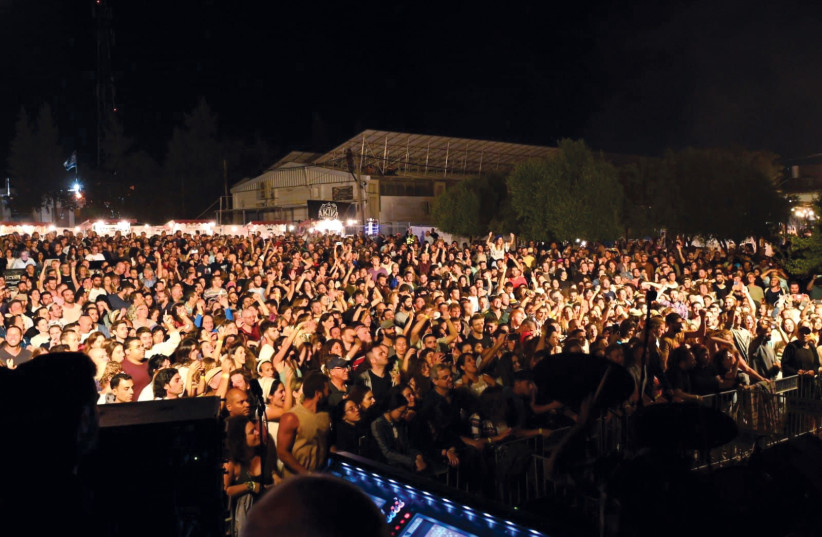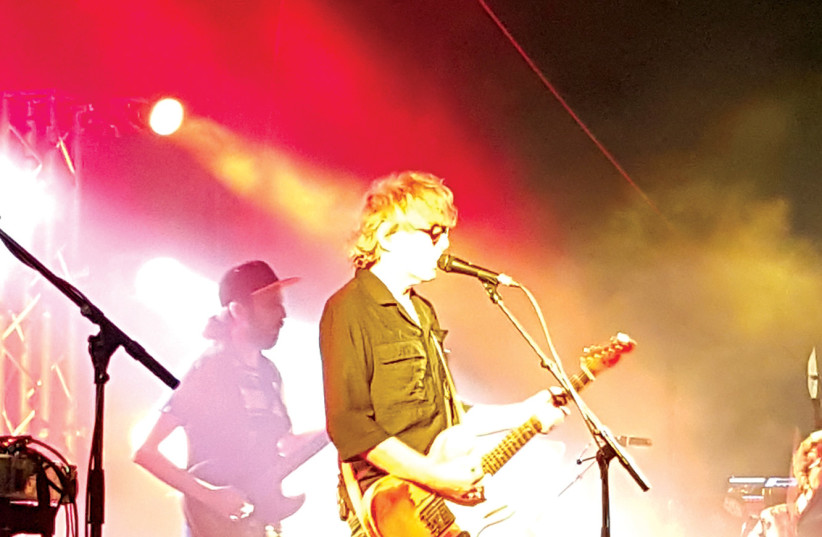Chill vibe, positive atmosphere, diverse – those were the words used by participants of the 2023 Tekoa Beer Festival. A festival started eight years ago by a small group of friends, this year’s event drew over 3,500 people to the Gush Etzion region community at the end of June.
A wide variety of locally brewed beer was available, in addition to hard cider, non-alcoholic infused tea and other beverages, and a variety of food from local restaurants. IPA from nearby Bat Ayin, gluten-free date beer, and a host of other choices were on tap.
This year’s festival featured popular Israeli rocker Berry Sakharof, who gained fame in the 1990s and released his most recent album in 2021. Other performances included the band Nameless Faces and DJ Eran Degani. Last year, well-known Israeli band Ethnix performed.
How the Tekoa Beer Festival has grown
Founder and producer of the festival, Yativ Leuchter, marveled at the growth of the event over the years.
Leuchter is a third-generation Gush Etzion resident, his grandparents having lived in Kibbutz Masu’ot Yitzhak, one of the four kibbutzim in Gush Etzion that were overrun when the Jordanians invaded in 1948. His grandparents were among those taken prisoner by the Jordanians. His grandmother Rachel Doron went on to help reestablish the communities after the Six Day War of 1967. She passed away this May at the age of 97.

Leuchter’s brother Yehuda was also on hand at the festival. Living in nearby Bat Ayin, Yehuda and his wife, Leora – born in Ethiopia – served handmade injera with traditional toppings. Other food included burgers and shwarma. Handmade crafts and clothing were on sale as well.
Among the 13 local breweries was a stand manned by Tsad Kadima, an organization for people with cerebral palsy and other motor disabilities. They hosted their own table with beer brewed by disabled adults from the organization.
“This is the second year we were invited to participate in the beer festival, and what’s important to emphasize is that we were invited as a micro-brewery alongside everyone else,” said Benjy Maor, head of resource development.
“The quality of our beer was very important to our folks. We want to be recognized like the others,” he said. “Selling out all our beer and getting asked for more after we ran out gave us great satisfaction.”
Maor added that the event helped give exposure to their programming.
“It’s a gateway to the summer, much more laid back and casual than other festivals, said festival goer Erica Schachne, editor of The Jerusalem Post Magazine.

Shlomo Ne’eman, head of the Gush Etzion Regional Council and chairman of the Yesha Council, said: “Tekoa has a large cluster of artists and intellectuals. It is a unique community on the edge of the desert, where religious and secular people live together in a diverse population.”
He explained that the initiative, started by individuals in the community to enjoy home-brewed beer and play guitar, was adopted by the council.
“The festival has become a magnet for us, from all over the country.”
Ne’eman stood on stage at the festival and praised Tekoa, its new artist’s center, and the creativity of the residents.
David Rudman, Gush Etzion’s head of tourism, told the Post that most of the beer is not commercially available but made in small quantities.
“This is not for livelihood but for love,” he said.
One of the beers is brewed by a grandfather, father, and son. Many others are family operations made for local consumption. Rudman also extolled the diverse population of Tekoa, stating that there were educators, army professionals, hi-tech personnel, and families that made up the community.
“Beer is their hobby and passion, not their profession,” he said. “We don’t want to grow that big.”
The locals are proud that their festival has attracted big-name musicians, but they also want to keep the scene intimate with a hometown feel. That is why most of the beer featured at the festival is not available in stores.
Unlike wine festivals or beer festivals in cities like Jerusalem or Tel Aviv, the Tekoa festival is not about purchasing bottles to bring home. Attendees receive a ticket for one free glass, with the rest available for purchase. All cups and other disposables are made from biodegradable material, something keeping in keeping with Tekoa’s values.
Unlike wine, Rudman explained, the kosher status of beer usually does not require certification, as there would be nothing non-kosher in the manufacturing process of beer. The only issue that arose for festival organizers was whether or not the brewers sold their chametz before Passover, when bread and leavened food products are not to be consumed. For most that would not be a problem, since the beer would have been brewed well after Passover ended.
Tekoa resident Ezra Amichai said it was his fifth time at the event.
“It’s a festival of unity. No judgment here. It’s an open space.”
He credited the relatively new road from Jerusalem to Tekoa for cutting travel time dramatically and transforming the scene from a local event to something larger.
“Once they opened up that corridor, that changed everything and was the end of our rural days,” he said. “You used to have to go all the way to Efrat and then back around.”
In recent years, Tekoa has grown to become the largest of the 22 communities making up the Gush Etzion Regional Council.
Tekoa has a rich history dating back to the Bible, where it is mentioned several times as the hometown of Amos the prophet, whose tomb is nearby; and the birthplace of the wise woman who advised King David. Mount Herodian, where the palace of King Herod the Great was located, towers in the distance, its ruins now an archaeological site.
Adding a historical perspective, Rudman explained that grapes were traditionally grown in the hill country of Judea closer to Hebron, but wheat and barley grow better in Tekoa.
“Especially the fields going towards the desert near Mount Herodian because that area is warmer and was not as good for growing grapes, which need a higher and cooler climate,” he said.
Rudman added that much of the Book of Ruth took place in Bethlehem, which today is about a 20-minute drive from Tekoa. When Ruth was gleaning barley in the fields and met her future husband Boaz, it was probably in Tekoa, he said.
“The whole story happened where the beer festival is. I don’t know if they had beer, but I am sure that during the time of the Bible, they did not have only wine. I am guessing they had some kind of drink made out of wheat and barley.” He added that there are references to “strong drink” throughout the Bible.
“I think of King David as a shepherd walking through these same fields with his harp,” Rudman said. “The stories of him fighting the lion must have happened exactly where the beer festival is.
“One of the first musicians of the Jewish nation played music here, and thousands of years later we are doing the same.” ❖
